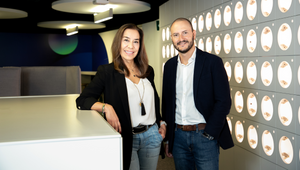
How Ogilvy Is Using Soap to Speak Out Against Gender-Based Violence

While gender-based violence is a global issue, in Mexico, the problem has grown severely in the past two years. According to statistics from the country’s executive secretariat of the National Public Security System, 10 women are murdered in Mexico on a daily basis. Additionally, as of March 28th 2022, 357 women have been reported missing since the year began.
It’s for reasons like these that Ogilvy Mexico and feminist organisation Cruces X Rosas are working toward change. Their new campaign, titled ‘El Jabón que Mancha' or ‘Stain Soap’, features moulded soap intended to look like the silhouettes of victims of gender-based violence. Additionally, when used, the soap leaves behind a violet stain in an attempt to speak out against society’s decision to ‘wash their hands of responsibility’ every time such offenses are tolerated.
Ogilvy VP creative Diego Rodriguez and Cruces X Roses co-founder Tatiana Rico spoke to LBB’s Josh Neufeldt about the making of this campaign.
LBB> What was the brief for this campaign like? What immediate ideas came to mind when you first saw it?
Diego> Undoubtedly, March is the month that reminds us of the scandalous statistics that we have in Mexico about the violence and abuse that our women suffer every day. This, more than a brief, is the real opportunity to contribute with a solution to a problem that as a society is very difficult to solve if we do not start with the most basic thing - re-educating ourselves. But above all else, this is a real opportunity to give tools and assistance to millions of women who are afraid to denounce and go against their aggressors.
LBB> The idea that society is washing its hands when offenses against women are not adequately made visible is a powerful one. How did you come up with and develop the idea and name for ‘El Jabón que Mancha' or ‘Stain Soap’?
Diego> The idea was to transform the popular expression ‘wash your hands’ and give it a new perspective. That is why we decided to make a soap that, on contact with water, instead of cleaning our hands, would stain us and show us the responsibility we have as a society to be part of the solution to a problem that has been going on for decades.
LBB> What was the collaboration between Ogilvy and feminist group Cruces X Rosas like?
Diego> The founders of Cruces X Rosas are a couple of creative women who were part of the advertising industry, so working with them meant having one more ally for the idea. They were very aware of what it takes to make a great idea come true and all the courage and passion it takes, so everything went smoothly and very professionally. We were also very aligned about what the purpose and objective of our campaign was and the impact and effect we wanted to generate in our society.
Tatiana> It was a very enriching and rewarding experience because for at least four months, we had several meetings, interviews, visits, debates and rounds of messages where together, we learned about law, creativity, soaps, 3D printing and a lot of new things. It wouldn't have been possible if the whole team hadn't had a huge desire to change the world a little bit - millennials right?
The cause was the biggest motivator. The insight was powerful and we loved the idea. Each member took ownership of the project and its responsibilities with the intention of giving a strong message and generating an impact on society through creativity.
LBB> The soap is designed to contain the silhouettes of women victims of violence. What was the creation process like? Who designed and manufactured them?
Diego> The silhouettes of the soaps are inspired by the faces of thousands of women who have been victims of violence. However, none of these faces are real. We wanted to have a neutral approach because we figured that if we used real faces, we might be crossing sensitive barriers for the families of those victims and we wanted to show the utmost respect.
We did countless tests with a lot of suppliers who helped us design the faces first. Then we ended up making moulds and 3D printing. But aside from crafting the moulds using 3D printing techniques, the process of making the soap was very traditional.
The big challenge was finding a secret ingredient that would leave a stain on contact with water. It needed to be something that would not be diluted by the properties of soap and would have the desired effect when washing hands. We achieved it by including an exact amount of violet vegetable ink in each soap, because that is the colour that represents the feminist movement against gender violence.

LBB> What did the process of developing ‘Stain Soap’ look like for Cruces X Rosas?
Tatiana> At first, we wanted to make a campaign in which the focus was laws in Mexico, but after investigations, interviews and analysis we realised that for this problem, we had to start from education and awareness. We were very careful not to re-victimise, so we carefully reviewed each text and the design of the soaps parallel to that. The creatives did an incredible job because after several attempts and suppliers, they managed to get the faces of the women to be of different ages while also staining, which was not an easy task.
In the final phase, we worked together with the public relations team to decide on the people who should receive the soap. We chose people who had something important to say, who wanted to generate changes and who were connected to the DNA of the idea and Cruces X Rosas.
LBB> What has the response to the campaign been like? Have lots of people been posting their stained hands on social media?
Diego> During March and April, we invited dozens of opinion leaders, influencers and the media to be part of ‘Stain Soap’ and to make the initiative visible through their social networks and media. The initiative has had a positive response, especially from feminist groups, which in this case was the biggest challenge since the issue to be addressed is very delicate and sensitive. But to date, we have achieved hundreds of positive comments and dozens of impressions across different media platforms and portals. Conversations were generated everywhere; inviting people to reflect, share experiences and stories and to be part of the conversation about gender violence in Mexico. After all, the first step to ensuring we don’t wash our hands of violence is to start talking.
LBB> You talked about deconstructing the patriarchal ideas in love to prevent violence. What does this look like?
Tatiana> There are many ideas that patriarchy has imposed on us, but we think that one of the main ideas we must eradicate is when the role is given to the man as ‘provider’ and to the woman as ‘caretaker’. This thought generates asymmetrical relationships and makes the dependency (economic and emotional) the axis of the relationship. Another idea that we must deconstruct is that love is ‘to endure’ and that we must save marriage or couple relationships at any cost.
LBB> What challenges have you faced during this initiative? How did you overcome them?
Diego> The biggest challenge was to gain the support and acceptance of all feminist women on such an important date. Entering this conversation is a very delicate matter in a country where the cultural context is shaken by all kinds of feelings and reactions to brands that want to take advantage of the occasion by delivering messages that do not contribute to solving anything and, on the contrary, are seen as opportunistic campaigns that lack purpose.
LBB> You mentioned that making people aware of gender-based violence is one of your primary goals. What do you think people can do better to educate themselves?
Tatiana> The first step is to understand that gender violence is a problem that affects us all, and is not only a problem for the victims or women. Secondly, it is important to know and identify the warning flags. Examples include: people isolating themselves, people changing things like their personalities, ways of speaking or clothing, or people who now feel afraid to talk about their partner. Extreme cases come when there are obvious signs of physical violence or when someone is inexplicably absent. And all these can occur within the relationships.
Within the workplace, gender-based violence can be any act, no matter how small, that denigrates your co-worker for the simple fact that they are not a man and are subsequently inferior. In any case, we must raise our voices and offer our help.
However, this is a vast issue and we believe that the way to educate ourselves is by listening to the victims through documentaries, podcasts, TED Talks, books or by searching for government programs on this subject and having help numbers on hand.

LBB> This campaign is designed to focus on violence against women in Mexico, but if it’s successful, could we potentially see a follow-up campaign on a bigger scale?
Diego> We would love to continue building the path to a more educated society on this problem. We will surely continue to bring more ideas to the table that hopefully have a positive impact on us and on everyone as a society. This surely cannot be achieved with a single campaign and hopefully next year we will continue the conversation.
LBB> Is there anything you’d like to add?
Diego> It is incredible to see that creativity really has no borders or limits. We are very grateful to be able to add to this conversation through a creative idea and that we can raise awareness about this sensitive issue that we all must work on.
Tatiana> I would like to add that if any woman is reading this note and believes that she is in a violent relationship or is being violated in another way, remember that you are not alone. Identifying and accepting that you are a victim is not easy, but asking for help is the first step and there are hundreds of groups or people by your side with whom you can count on and, if you can, get out of there. ‘Stain Soap’ is a symbol to raise our voices and work together as a society to reduce gender violence.















